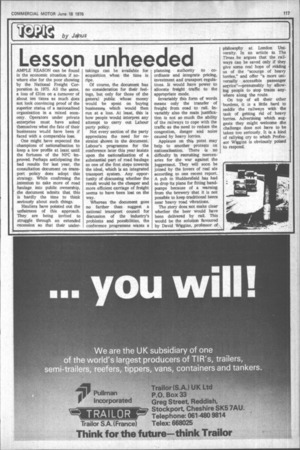Lesson unheeded
Page 119

If you've noticed an error in this article please click here to report it so we can fix it.
AMPLE REASON can be found in the economic situation if nowhere else for the poor showing by the National Freight Corporation in 1975. All the same, a loss of E31m on a turnover of about ten times as much does not look convincing proof of the superior status of a nationalised organisation in a mixed economy. Operators under private enterprise must have asked themselves what the fate of their businesses would have been if faced with a comparable loss.
One might have expected the champions of nationalisation to keep a low profile at least until the fortunes of the NFC improved. Perhaps anticipating the bad results for last year, the consultation document on transport policy does adopt this strategy. While confirming the intention to take more of road haulage into public ownership, the document admits that this is hardly the time to think seriously about such things.
Hauliers have pointed out the unfairness of this approach. They are being invited to struggle through an extended -recession so that their under takings can be available for acquisition when the time is ripe.
Of course, the document has no consideration for their feelings, but only for those of the general public whose money would be spent on buying businesses which would then run at a loss. At least, this is how people would interpret any attempt to carry out Labour party policy.
Not every section of the party appreciates the need for restraint shown in the document. Labour's programme for the conference later this year insists upon the nationalisation of a substantial part of road .haulage as one of the first steps towards the ideal, which is an integrated transport system. Any opportunity of discussing whether the result would be the cheaper and more efficient carriage of freight seems to have been lost on the way.
Whereas the document goes no farther than suggest a national transport council for discussion of the industry's problems and possibilities, the conference programme wants a planning authority to coordinate and integrate pricing, investment and transport regulations. It would have power to allocate freight traffic to the appropriate mode.
Invariably this farm of words means only the transfer of freight from road to rail. Invariably also the main justification is not so much the ability of the railways to cope with the traffic as the need to reduce the congestion, danger and noise caused by heavy lorries.
Applause on this point may help to smother protests on nationalisation. There is no difficulty in recruiting mercenaries for the war against the juggernaut. They will soon be joined by the lovers of real ale according to one recent report. A pub in Huddersfield has had to drop its plans for fitting handpumps because of a warning from the brewery that it is not possible to keep traditional beers near heavy road vibrations.
The story does not make clear whether the beer would have been delivered by rall. This would be the solution favoured by David Wiggins, professor of.
philosoPhy at London University. In an article in The Times he argues that the ralways can be saved only if they give some real hope of ridding us of the "scourge of heavy lorries," and offer "a more universally accessible passenger secvice"--presumably by allowing people to stop trains anywhere along the route.
On top of all their other burdens, it is a little hard to saddle the railways with the task of getting rid of heavy lorries. Advertising which suggests they might welcome the challenge dose not have to be taken too seriously. It is a kind of rallying cry to which Professor Wiggins is obviously poised to respond.












































































































































































